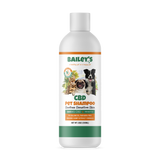Jack Russell Old Age Problems: Senior Dog Concerns

In this article, with the help of the friendly team at Bailey’s CBD , we will explore the unique set of challenges that come with caring for senior Jack Russell Terriers. As our faithful companions age, it becomes crucial for dog owners to understand the aging process and address the various health issues and behavioral changes that may arise. By providing proper nutrition, exercise, and veterinary care, we can help our older Jack Russells lead happy and comfortable lives.

Table of Contents
- 1. Understanding the Aging Process in Jack Russells
- 2. Health Issues Commonly Faced by Senior Jack Russells
- 3. Behavioral Changes in Aging Jack Russells
- 3.1 Changes in Sleep Patterns
- 3.2 Increased Anxiety or Agitation
- 3.3 Cognitive Decline and Confusion
- 4. Nutrition and Exercise for Senior Jack Russells
- 5. Veterinary Care for Older Jack Russells
- 6. Conclusion
1. Understanding the Aging Process in Jack Russells
As with any living being, aging is an inevitable part of a Jack Russell Terrier's life. Understanding the process and what to expect can help us better care for our furry friends.
Jack Russell Terriers are known for their lively and energetic nature, but as they age, their energy levels may start to decrease. They may not be as eager to chase after balls or go on long walks as they once were. However, it's important to note that each dog is unique, and some Jack Russells may maintain their high energy levels well into their senior years.
1.1 The Life Expectancy of Jack Russell Terriers
On average, Jack Russell Terriers live between 13 and 16 years. However, with proper care, some may reach their late teens or even early twenties. Genetics, lifestyle, and overall health play a significant role in determining their lifespan.
Providing a balanced diet, regular exercise, and routine veterinary care are essential for ensuring the longevity of your Jack Russell Terrier. Regular check-ups can help detect any potential health issues early on, allowing for prompt treatment and management.
1.2 Common Signs of Aging in Jack Russells
As our Jack Russells age, they may experience various physical and behavioral changes. While these changes can vary from dog to dog, some common signs of aging include:
- Decreased energy levels: Your once hyperactive Jack Russell may start to slow down and prefer more leisurely activities.
- Weight gain or loss: Aging can affect a dog's metabolism, leading to weight fluctuations. It's important to monitor their weight and adjust their diet accordingly.
- Difficulty with mobility: Joint stiffness and arthritis are common issues in older Jack Russells. Providing them with comfortable bedding and considering joint supplements can help alleviate discomfort.
- Changes in appetite: Some aging Jack Russells may experience a decrease in appetite, while others may develop a ravenous appetite. Regularly monitoring their eating habits and consulting with a veterinarian is crucial.
- Dull or graying coat: Just like humans, Jack Russells may start to show signs of gray hair as they age. Their once vibrant coat may lose its luster, but proper grooming and a healthy diet can help maintain its condition.
It's important to remember that while these signs may indicate aging, they can also be symptoms of underlying health conditions. Regular veterinary check-ups and open communication with your veterinarian are vital for ensuring your Jack Russell's well-being as they enter their golden years.
2. Health Issues Commonly Faced by Senior Jack Russells
Senior Jack Russells, like any aging pet, are more prone to certain health issues that can significantly impact their quality of life. Pet owners need to be aware of these conditions and take appropriate measures to ensure their furry friend's well-being.
2.1 Joint and Bone Problems
Arthritis and other joint-related conditions commonly affect older Jack Russells. These conditions can cause pain, stiffness, and reduced mobility, making it difficult for them to enjoy their usual activities. It is crucial to provide proper care and support to alleviate some of the discomfort associated with these conditions.
One way to manage joint and bone problems is by providing joint supplements specifically designed for dogs. These supplements can help reduce inflammation and promote joint health. Additionally, creating a comfortable resting area for your senior Jack Russell, with soft bedding and support for their joints, can make a significant difference in their overall comfort.
While it may be tempting to limit their physical activity, moderate exercise is still essential for senior Jack Russells. It helps maintain muscle tone and joint flexibility. However, it is crucial to adjust the intensity and duration of exercise to match their capabilities and avoid putting unnecessary strain on their joints.
2.2 Vision and Hearing Loss
Just like humans, dogs may experience age-related vision and hearing loss as they grow older. Pet owners need to monitor any changes in their Jack Russell's sight or hearing and make necessary adjustments to their environment to ensure their safety and comfort.
If you notice your senior Jack Russell having difficulty seeing or hearing, it is advisable to consult with a veterinarian. They can assess the extent of the impairment and guide how to best accommodate your pet's needs. Simple modifications, such as rearranging furniture to create clear pathways and using visual cues for commands, can help your Jack Russell navigate their surroundings more easily.
Additionally, it is important to be patient and understanding with your senior Jack Russell. They may become more reliant on their other senses, such as smell and touch, to compensate for their vision or hearing loss. Providing them with a consistent and familiar environment can help them feel more secure and confident.
2.3 Dental Issues
Senior dogs, including Jack Russells, may develop dental problems as they age. These issues can range from periodontal disease and tooth loss to gum infections. Neglecting dental care can lead to pain, difficulty eating, and even more severe health problems.
Regular dental care is crucial for maintaining good oral health in senior Jack Russell. This includes brushing their teeth regularly with dog-friendly toothpaste and providing them with appropriate chew toys that promote dental hygiene. Chew toys can help remove plaque and tartar buildup, reducing the risk of gum disease.
It is also advisable to schedule regular dental check-ups with your veterinarian. They can perform professional cleanings and address any dental issues before they worsen. Early detection and treatment can prevent discomfort and potential complications down the line.
By being proactive in addressing these common health issues faced by senior Jack Russells, you can help ensure that your furry companion enjoys a comfortable and happy life in their golden years.
3. Behavioral Changes in Aging Jack Russells
Just as their bodies change, the behavior of senior Jack Russell can also transform. Understanding these changes can help us provide the necessary support for our furry companions.
As Jack Russells age, they may undergo various behavioral changes that can be attributed to the natural aging process. Dog owners need to be aware of these changes and adapt their care accordingly to ensure their pets' well-being.
3.1 Changes in Sleep Patterns
One noticeable change in senior Jack Russell is their sleep patterns. Older dogs tend to sleep more during the day and may become restless at night. This shift in sleep behavior can be a result of various factors, including changes in their internal clock, discomfort from age-related ailments, or even anxiety.
To help regulate their sleep, it is essential to create a comfortable sleeping environment for aging Jack Russells. Providing a cozy bed with supportive cushioning can alleviate any discomfort they may experience. Additionally, sticking to a consistent routine for feeding and exercise can help establish a sense of normalcy and promote better sleep patterns.
3.2 Increased Anxiety or Agitation
Another behavioral change that may occur in an aging Jack Russell is an increase in anxiety or agitation. This can manifest in various ways, such as restlessness, pacing, excessive barking, or even destructive behavior. The causes of this heightened anxiety can be multifaceted.
One contributing factor to increased anxiety in senior Jack Russells is cognitive decline. As dogs age, they may experience a decline in cognitive function, leading to confusion and disorientation. This cognitive decline can result in heightened anxiety as the dog struggles to navigate their surroundings and comprehend changes in their environment.
In addition to cognitive decline, health issues can also contribute to anxiety in aging Jack Russells. Conditions such as arthritis or other age-related ailments can cause discomfort and pain, leading to increased restlessness and agitation. It is crucial for dog owners to monitor their pet's health and seek appropriate veterinary care to address any underlying issues.
To help alleviate anxiety in senior Jack Russells, it is important to provide a safe and secure space where they can retreat when feeling overwhelmed. This can be a designated area in the house where they feel comfortable and protected. Engaging in soothing activities, such as gentle massages or interactive play, can also help calm their nerves and provide a sense of relaxation.
3.3 Cognitive Decline and Confusion
One of the most significant behavioral changes that an aging Jack Russell may experience is cognitive decline. This decline in cognitive function can result in confusion, disorientation, and memory loss. It is often referred to as "canine cognitive dysfunction," which is similar to Alzheimer's disease in humans.
Senior dogs with cognitive decline may exhibit various symptoms, including forgetting familiar routines, getting lost in familiar surroundings, or displaying changes in social behavior. They may become less responsive to commands or show signs of confusion when faced with new situations.
To help manage cognitive decline in aging Jack Russells, it is essential to provide mental stimulation. Engaging them in interactive games, puzzle toys, and training exercises can help keep their minds active and slow down the progression of cognitive decline. Maintaining a familiar routine and using positive reinforcement techniques can also help reduce confusion and provide a sense of security.
It is important to note that while cognitive decline is a common occurrence in aging Jack Russells, not all senior dogs will experience this condition. However, being aware of the potential changes and taking proactive steps to support their cognitive health can greatly enhance their overall quality of life.

4. Nutrition and Exercise for Senior Jack Russells
Proper nutrition and exercise are crucial for maintaining the health and well-being of senior Jack Russells.
4.1 Adjusting Your Dog's Diet as They Age
As Jack Russell's ages, their nutritional needs may change. Consult with your veterinarian to determine the most suitable diet for your senior Jack Russell. They may recommend adjusting portion sizes or switching to a senior-specific dog food formulated to support aging dogs.
4.2 The Importance of Regular Exercise for Senior Dogs
While senior dogs may not have the same stamina as when they were younger, regular exercise is still essential for maintaining their physical and mental health. Engaging in low-impact activities, such as short walks or gentle play sessions, can help keep your senior Jack Russell in good shape.
5. Veterinary Care for Older Jack Russells
Regular veterinary check-ups and specialized care are vital for the well-being of senior Jack Russells.
5.1 Regular Check-ups and Preventative Care
Senior dogs should undergo regular check-ups to monitor their overall health and detect any potential issues early on. Your veterinarian may recommend additional preventive measures, such as vaccinations, dental cleanings, and blood tests.
5.2 Managing Chronic Conditions
If your senior Jack Russell has a chronic illness, such as diabetes or heart disease, it's essential to work closely with your veterinarian to manage their condition. They may prescribe medications, suggest lifestyle changes, or provide specialized treatments to ensure your dog's well-being.











